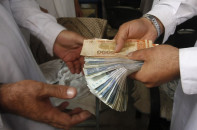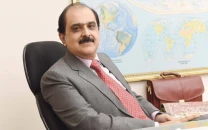Top Islamic advisory body: CII proposed death on blasphemy law misuse
In recommendations pending before parliament, CII had recommended the death penalty for anybody misusing the law.

Top Islamic advisory body: CII proposed death on blasphemy law misuse
Hardline clerics and right-wing parties are opposed to any change in the blasphemy law which rights groups say can be used to settle personal scores.
With this in mind, the Council of Islamic Ideology (CII) proposed some changes to stop the misuse of the blasphemy law. “These recommendations have been pending before parliament for the past three years,” a senior official in the CII told The Express Tribune requesting anonymity.
The recommendations were made in 2001 when Dr SM Zaman was heading the CII and two top religious scholars – Mufti-e-Azam Pakistan Maulana Muhammad Rafi Usmani and Mufti Muneeb-ur-Rehman – were also its members. Religious scholars of all schools of thought and sects were represented on the council.
“The CII’s recommendations remain valid until and unless they are rejected by parliament,” added the official.
Since the FSC is made up of five regular judges and three top religious scholars (Ulema), the CII thought it was in a better position to hear blasphemy cases to ensure the law was not abused.
The council recommended capital punishment for anybody misusing the blasphemy law. “The wrongful complainant and witnesses in a blasphemy case should be handed similar punishment as a guilty person,” it says.
Islamic jurisprudence experts say that the misuse of blasphemy law is tantamount to blasphemy and therefore a person who is guilty of misuse of this law should be punished under the same law.
However, the CII strongly opposed any amendment in the blasphemy law, particularly in Section 295-C, so far as the penalties are concerned.
According to the CII recommendations, a few procedural changes need to be made to make the FSC hear blasphemy cases, said the official.
Asked why these recommendations have not been made public, the official said, “They are confidential because the government has not tabled them in parliament for legislation.” According to the rules, CII’s recommendations are confidential until presented to the parliament.
The government had not implemented CII’s recommendations and has not cited any reason despite repeated reminders from the council to the ministries of interior, religious affairs and law. “The CII had asked the three ministries to explain the reasons as to why its recommendations on Section 295-C of the blasphemy law were not implemented,” the official said.
The CII had made these recommendations after increasing complaints from rights activists about the misuse of the blasphemy law. “We have been making recommendations to the government from time to time to make the law acceptable to all,” another unnamed CII official told The Express Tribune.
Police have charged 1,274 people with blasphemy offences during the period between 1986 and 2010. Sixty per cent of the people charged were non-Muslims. Though several accused were murdered during or before trial, no judicial execution has taken place in the country so far.
Published in The Express Tribune, January 13th, 2011.



















COMMENTS
Comments are moderated and generally will be posted if they are on-topic and not abusive.
For more information, please see our Comments FAQ